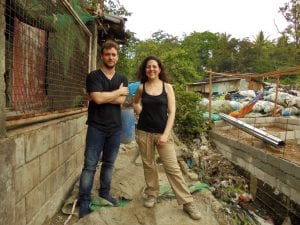Yutong Li – March 2017: Choosing priorities and learning from others
By ucqnafe, on 12 March 2017
MPA student Yutong Li provides insights into studying at UCL STEaPP.
If I was asked to use one word to describe my first term at STEaPP, it would be ‘enriching’.
To some degree, I would also have a word of warning for students who are not prepared for a packed life of studying an MPA in the UK. Except for several afternoons, the timetable for MPA students is pretty uniform. Each morning we have an early class at 9:00 close to UCL’s Gordon Square, a garden with a small coffee shop where students can have a break between lectures and seminars. I used to be a procrastinator and feel unwilling to get up early but the timetable has forced me to adjust my biological clock and use my time to the full. I even tell my roommate, who only has 2 classes each week, the joke that my tuition fees are being far better spent, due to the number of classes I have to attend, and the effort from both teachers and students.” On the other hand, sometimes the schedule seems a little bit inflexible and lacks enough time for students to deal with personal issues, especially in the scenario weeks where there are task deadlines almost every the afternoon. However, almost all my classmates have a strong ability to manage their time, which is also an encouragement for me to carry on and not be a couch potato.
Besides the tight course schedule, another interesting thing is to recognise about the MPA is the wide range of nationalities and different personalities in our cohort. Pato is from Mexico and always wears a big smile and is friendly to everyone. Diego is also from Mexico and is very eloquent and a quick thinker who reminds me of my previous classmates in undergraduate law school. Sam is a diligent and smart student with high marks. I often wonder how many clothes he owns as he is always very well dressed with different outfits each day! Irvanu is an IT whizz and an expert on software like Excel and Powerpoint. Kana is from Japan, she’s very polite and respectful of other people’s opinions. She is also a very impressive presenter. Sanaa is the first person I’ve met from the United Arab Emirates and through her we were lucky enough to attend World Government Summit in Dubai in February 2017. Her ability in coping with different tasks is excellent. Sandy is friendly and professional in searching for useful information. Elly and Angel are good friends, who bring laughter and kindness to the cohort. Eliana is very engaged in classes and acts responsibly in our group tasks. Alice is from China like me and is very kind and always feeding classmates with various snacks. Siqi is gentle and thoughtful – sending us all Christmas cards with warm words. Ana is highly efficient in her work and Xi is modest and considerate, with an independent way of thinking about the world. Overall, my MPA classmates each have their unique strength and are all nice people, which creates a good environment for daily study.
Because policy-making requires both technical and theoretical tools, the MPA at STEaPP is well-designed to equip students for their future careers. Not only that but policy-making is also an art which requires talent and intuition in order to make decisions. Learning to work with a wide range of different people is vital – and the cohort is learning so much from each other as well as through our teaching. Though we’re only part of the way through the course, we all feel like we’re developing the diverse range of skills required to navigate the world of policy making.
 Close
Close


